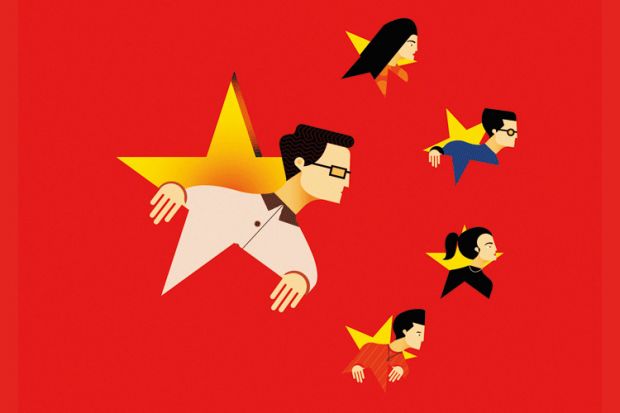One of the great ironic juxtapositions of 2015 must surely have been the cheering, red-T-shirted crowds lining the Mall in London for the carriage procession of China’s president, Xi Jinping, to Buckingham Palace, while, half a mile away, a very different crowd queued for tickets to Ai Weiwei’s exhibition at the Royal Academy of Arts.
Ai’s installations – marble surveillance cameras trained on a marble pushchair; ceramic copies of the bones of victims of labour camps; tons of reinforcing bars from collapsed school buildings from the 2008 Sichuan earthquake painstakingly hammered straight – tell of a political reality far removed from Mr Xi’s “China Dream”.
The majority of the smiling young flag-wavers caught in the press photographs were, of course, Chinese students studying in British universities. According to figures from the Higher Education Funding Council for England, almost one-quarter of postgraduate students at English universities are Chinese. The patriotism of these young people is, at one level, simple and easy to understand. But when we consider the context of Ai’s artworks, a deeper question arises about the students’ inability to separate nation from regime, and to embrace a perspective on their country that is at once affectionate and rationally critical.
This problem also goes to the core of the dissonance that many of these same young people experience when faced with the demands of a Western, liberal education. After language, the greatest difficulty Chinese students face, particularly in the arts and social sciences, is in adopting the critical thinking that the Quality Assurance Agency insists master’s level courses must inculcate.
A good deal of research has been carried out into this problem. Explanations tend to centre on China’s Confucian cultural tradition, which shies away from confrontational debate, preferring to seek conciliation. And conclusions on how to negotiate it have ranged from adopting a “culturally sensitive” approach, gentling students into a rapprochement with Western academic approaches, to a more full-blooded post-colonialist rejection of Western critical thinking as “conceptual colonialism”.
However, this will not quite do. Confucianism’s centrality to Chinese education has been under attack from reformers since the late 19th century. With the New Culture Movement in the early 20th century, the Confucian classics were largely abandoned, as Chinese intellectuals embraced Western notions of science and democracy. On a visit to China in 1920-21, Bertrand Russell recorded that “modern Chinese schools and universities are...institutions where the student is taught to think freely, and his thoughts are judged by their intelligence, not by their utility to exploiters”.
But since the communist revolution in 1949, Chinese university students have had to study a compulsory programme of ideological and political education overseen by the propaganda department of the Chinese Communist Party. It has seen many incarnations under successive leaders but has always retained its core purpose of binding the population to party doctrine and discouraging critical dissent. What is significant about the programme is not so much its intellectual content as the pedagogic means by which it is taught, depending entirely on the rote learning of standard party lines on political values and the interpretation of Chinese history.
A few students bridle against this, but most adopt an attitude of pragmatic acquiescence, seeing success in the course as an intellectually irrelevant but practically necessary passport to a degree and future employment. It is not, then, a question of brainwashing – and there is no doubt that some Chinese students also made their way across St James’ to the Royal Academy of Arts. But it remains the case that all Chinese students are subjected to a systematic attempt to inculcate a culture in which criticism of authority is an alien idea, scarcely even imaginable by a respectable citizen. It is little wonder that so many struggle when transported to Western seminar rooms, in which success depends precisely upon the demonstration of independent critical thought.
The issue goes beyond pedagogy, to the very core of what Western universities purport to be. To be admitted to a university is to become part of a community in which the universal value of disinterested critical enquiry is paramount. However much we may sympathise with, and try to accommodate, the different experiences that international students bring with them, this is a matter about which there can be no compromise. We must surely believe that attempting to engage all our students fully in the practices that define our own enquiry – however unnaturally it may come to some of them – is the first duty of any teacher.
Tao Zhang is a senior lecturer in the College of Arts and Science at Nottingham Trent University.
后记
Print headline: We must teach critical thinking to students conditioned to conform




